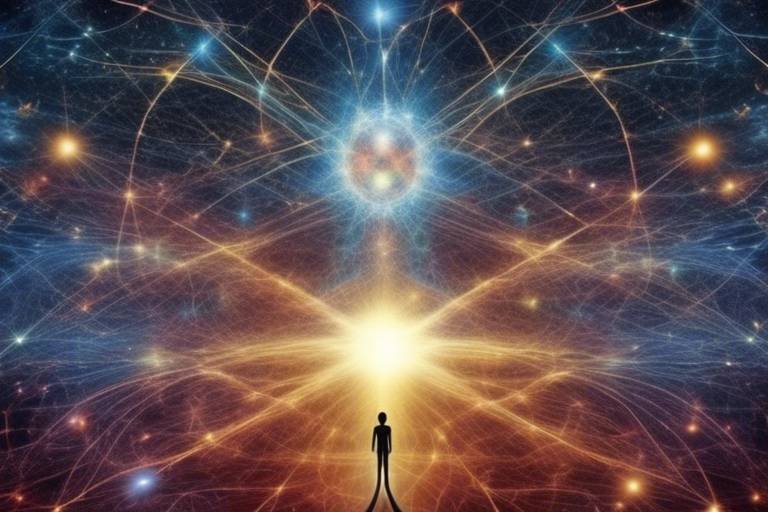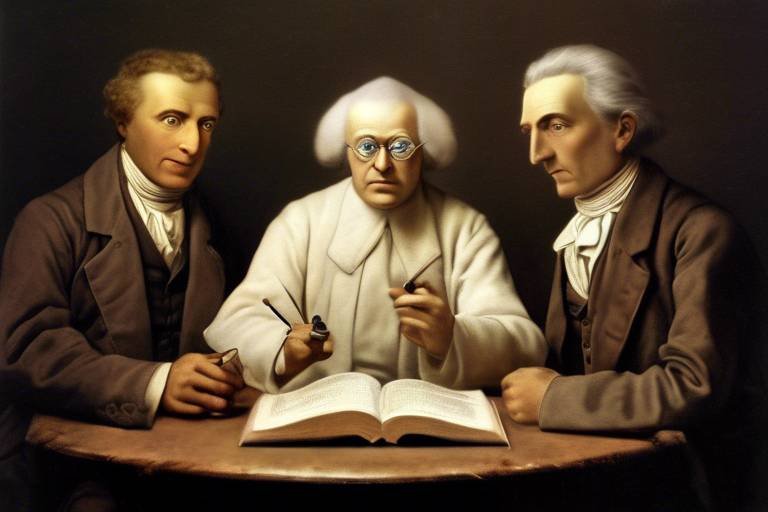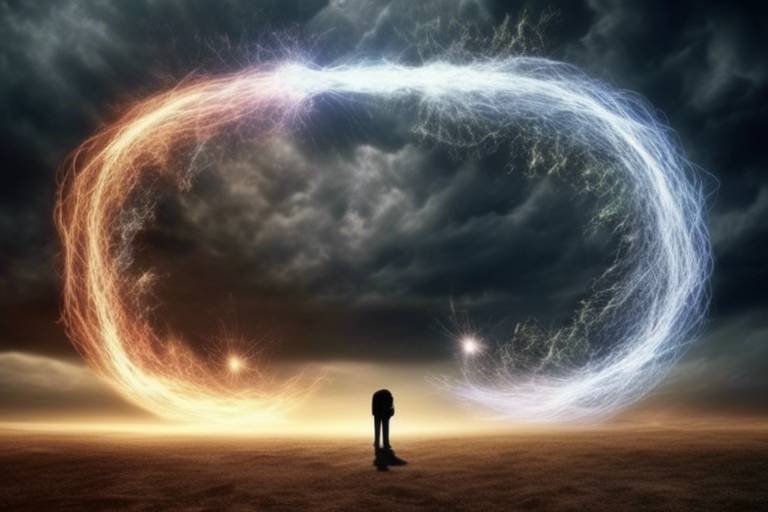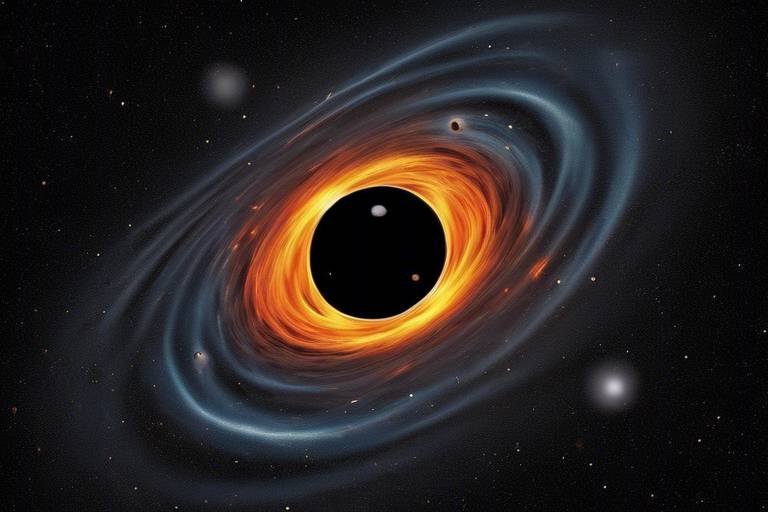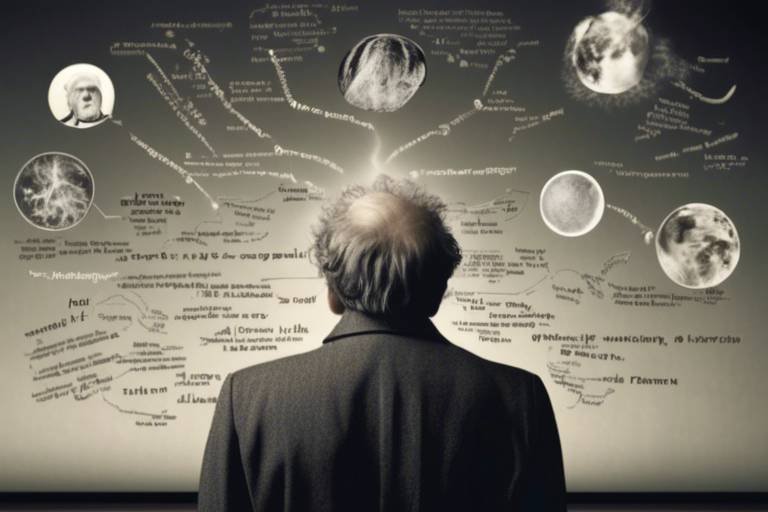Quantum Mysteries - The Bridging Role of Philosophy
Welcome to the fascinating world where the intricate dance of quantum physics meets the profound inquiries of philosophy. At first glance, these two fields may seem worlds apart, like oil and water, but in reality, they intertwine in ways that can reshape our understanding of existence itself. Imagine standing at the edge of a vast ocean of knowledge, where each wave represents a different question about reality, existence, and the nature of the universe. As we dive into this exploration, we will uncover how philosophical perspectives serve as a bridge, illuminating the complex phenomena of quantum mechanics.
In the realm of quantum physics, we encounter mind-bending concepts that challenge our traditional notions of reality. Particles can exist in multiple states at once, and their behavior can seem to defy logic. This is where philosophy steps in, acting as a guiding light through the fog of uncertainty. By examining the implications of quantum mechanics, we are prompted to reevaluate what it truly means to exist. Are we merely observers in a universe governed by chance, or do we play an active role in shaping reality? These questions not only pique our curiosity but also push the boundaries of human thought.
Philosophy offers various interpretations of quantum mechanics, each providing a unique lens through which we can view the universe. The Copenhagen interpretation, for instance, suggests that a quantum particle exists in a state of probability until it is observed. This idea raises intriguing questions about the role of the observer and the nature of knowledge itself. On the other hand, the many-worlds interpretation posits that every possible outcome of a quantum event exists simultaneously in parallel universes. This perspective leads us to ponder profound philosophical questions about identity, reality, and our place within it.
As we delve deeper into quantum entanglement, we find ourselves grappling with the interconnectedness of particles. This phenomenon challenges classical notions of separateness and individuality, prompting us to rethink our understanding of relationships and the fabric of reality. It’s as if the universe is whispering secrets about how everything is intricately woven together, urging us to consider that our existence may be more interconnected than we ever imagined.
Furthermore, the philosophy of science plays a crucial role in shaping our understanding of quantum theory. It invites us to examine the implications of scientific paradigms and the nature of scientific inquiry in the quantum realm. The debate between scientific realism and anti-realism becomes particularly significant, influencing how we interpret scientific theories and their relation to the underlying reality. Are we uncovering truths about the universe, or are we merely constructing useful models that help us navigate its complexities?
As we navigate through these philosophical inquiries, we also encounter unique epistemological challenges. Quantum mechanics compels us to question how we acquire knowledge and the limits of human understanding in a world governed by principles that often defy intuition. It’s a humbling realization that our grasp of reality may be just a flicker in the vast expanse of the universe’s mysteries.
In conclusion, the relationship between quantum physics and philosophy is not just a theoretical exercise; it is a profound journey into the depths of existence. By embracing the questions and uncertainties presented by quantum phenomena, we open ourselves to a richer understanding of reality. So, let’s take a step back, breathe in the wonder of the cosmos, and allow philosophy to guide us through the enigmatic landscape of quantum mysteries.
- What is quantum mechanics? Quantum mechanics is a fundamental theory in physics that describes the behavior of matter and energy on very small scales, such as atoms and subatomic particles.
- How does philosophy relate to quantum physics? Philosophy helps us interpret the implications of quantum mechanics, prompting us to question our understanding of reality, existence, and knowledge.
- What are the main interpretations of quantum mechanics? The two primary interpretations are the Copenhagen interpretation, which emphasizes the role of the observer, and the many-worlds interpretation, which suggests that all possible outcomes exist in parallel universes.
- What is quantum entanglement? Quantum entanglement is a phenomenon where particles become interconnected in such a way that the state of one particle instantly influences the state of another, regardless of the distance between them.
- Why is the philosophy of science important in quantum theory? The philosophy of science examines how scientific theories are constructed and interpreted, influencing our understanding of the nature of reality as described by quantum mechanics.

The Nature of Reality
When we dive into the world of quantum mechanics, we quickly realize that our traditional notions of reality are put to the test. Imagine standing on the edge of a vast ocean, where every wave represents a different possibility, and every drop of water is a potential outcome. This is akin to how quantum phenomena challenge our understanding of existence. At the quantum level, particles behave in ways that seem utterly bizarre compared to our everyday experiences. They can exist in multiple states at once, and their properties can change based on observation. This leads to a fundamental question: What does it truly mean to exist?
Philosophically, this challenges our long-held beliefs about the nature of reality. Are we merely observers in a universe that exists independently of us, or do our perceptions actively shape the reality around us? The implications are profound. For instance, consider the concept of superposition, where particles can be in multiple states until measured. This phenomenon suggests that reality is not a fixed entity but rather a fluid tapestry woven from countless possibilities. In this context, existence becomes a collaborative effort between the observer and the observed.
Furthermore, the implications of quantum mechanics extend beyond mere academic curiosity. They touch on our understanding of consciousness and existence itself. If reality is influenced by observation, does that mean our thoughts and intentions can shape the world around us? This idea can be both exhilarating and daunting. It raises philosophical inquiries about free will, suggesting that our choices might not be as independent as we once believed. In a universe governed by probabilities, are we merely navigating a predetermined path, or do we hold the reins of our destiny?
To illustrate these concepts, consider the following table that summarizes some key philosophical questions raised by quantum mechanics:
| Question | Implication |
|---|---|
| What is the role of the observer? | Challenges the idea of objective reality |
| Do particles have defined properties without observation? | Questions the nature of existence |
| Can consciousness influence physical reality? | Explores the connection between mind and matter |
In essence, the nature of reality as informed by quantum mechanics is a complex interplay of observation, existence, and consciousness. It nudges us to reconsider our place in the universe and the very fabric of reality itself. As we unravel these mysteries, we find ourselves at the crossroads of science and philosophy, where each field enriches the other, offering deeper insights into the profound questions that define our existence.
As we continue this journey into the quantum realm, we must ask ourselves: Are we ready to embrace a reality that is as strange and unpredictable as the quantum world itself? The answers may not come easily, but the exploration is sure to be a thrilling ride.
- What is quantum mechanics? Quantum mechanics is a fundamental theory in physics that describes the physical properties of nature at the scale of atoms and subatomic particles.
- How does quantum mechanics challenge our understanding of reality? It introduces concepts like superposition and entanglement, which suggest that reality may not be as straightforward as it appears.
- What are the philosophical implications of quantum mechanics? Quantum mechanics raises questions about the nature of existence, the role of the observer, and the concept of free will.

Philosophical Interpretations of Quantum Mechanics
Quantum mechanics is not just a set of mathematical equations; it’s a doorway into a world that challenges our very understanding of existence. As we dive into the philosophical interpretations of quantum mechanics, we find ourselves at the intersection of science and philosophy, where questions about reality and consciousness intertwine. The two most prominent interpretations that often come to the forefront are the Copenhagen interpretation and the many-worlds interpretation. Each of these perspectives offers a unique lens through which we can explore the intricacies of quantum phenomena and their implications for our understanding of reality.
The Copenhagen interpretation, which emerged in the early 20th century, suggests that quantum particles exist in a state of probability until they are observed. This notion raises profound questions about the role of the observer. Are we mere spectators in the cosmic theater, or do our observations actively shape the reality around us? This interpretation implies that knowledge itself is not absolute but rather contingent upon observation. It forces us to confront the uncomfortable idea that reality might not exist independently of our perception.
On the other hand, the many-worlds interpretation posits that every quantum event branches into multiple universes, each representing a different outcome. Imagine a vast multiverse, where every decision you’ve ever made has resulted in a parallel universe where you chose differently. This interpretation not only expands our understanding of existence but also challenges our notions of identity and free will. If every possible outcome exists simultaneously, what does that mean for our choices? Are we truly the authors of our fate, or are we simply navigating through a predetermined tapestry of realities?
To further illustrate these interpretations, let’s take a look at a comparison table:
| Interpretation | Core Idea | Philosophical Implications |
|---|---|---|
| Copenhagen Interpretation | Particles exist in a state of probability until observed. | Reality is observer-dependent; knowledge is contingent. |
| Many-Worlds Interpretation | All possible outcomes of quantum events exist in parallel universes. | Challenges notions of identity, free will, and reality. |
As we ponder these interpretations, we cannot ignore the implications for free will. The Copenhagen interpretation suggests that our observations influence reality, which might imply a level of control over our existence. However, this view can lead to a deterministic outlook, where everything is preordained until observed. In contrast, the many-worlds interpretation opens up a realm where every choice branches into a new universe, suggesting a more complex relationship between choice and reality.
Critics of the Copenhagen interpretation argue that it lacks a complete understanding of quantum mechanics, leading to the development of alternative theories. These critiques highlight a fundamental tension in our understanding of the quantum realm: how do we reconcile the probabilistic nature of quantum events with our intuitive notions of reality? The philosophical discussions surrounding these interpretations are not merely academic; they have real implications for how we view ourselves and our place in the universe.
In summary, the philosophical interpretations of quantum mechanics invite us to rethink our understanding of reality, existence, and free will. They challenge us to consider not just the mechanics of the universe, but also the profound questions about consciousness and identity that arise from these interpretations. As we continue to explore the depths of quantum phenomena, one thing becomes clear: the dialogue between quantum physics and philosophy is as intricate and fascinating as the universe itself.
- What is the Copenhagen interpretation? It suggests that quantum particles exist in a state of probability until observed, emphasizing the role of the observer in defining reality.
- What does the many-worlds interpretation propose? It posits that all possible outcomes of quantum events exist simultaneously in parallel universes, leading to complex questions about identity and free will.
- How do these interpretations affect our understanding of reality? They challenge traditional views of existence and encourage a reevaluation of concepts such as determinism and human agency.

The Copenhagen Interpretation
The Copenhagen Interpretation stands as one of the most influential frameworks for understanding quantum mechanics. Proposed by physicists such as Niels Bohr and Werner Heisenberg in the early 20th century, this interpretation suggests that quantum particles do not have definite properties until they are measured. Imagine a coin spinning in the air; while it's in motion, it exists in a state of uncertainty—neither heads nor tails. It's only when you catch it that it assumes a definite state. This analogy encapsulates the essence of the Copenhagen Interpretation, which posits that the act of observation plays a crucial role in determining the state of a quantum system.
This interpretation raises profound questions about the nature of reality and our role as observers. For instance, if particles exist in a state of probability, what does it mean for our understanding of knowledge? Are we mere spectators in a cosmic play, or do our observations actively shape the reality we perceive? The philosophical implications are staggering, prompting us to reconsider the significance of the observer in defining existence itself.
Moreover, the Copenhagen Interpretation invites discussions about the concept of free will. If the universe operates on probabilities rather than certainties, how do we reconcile this with our traditional notions of human agency? Are our choices predetermined by the probabilities of quantum events, or do we possess the power to influence outcomes? This interplay between quantum mechanics and free will challenges us to rethink our understanding of autonomy and control in a probabilistic universe.
However, the Copenhagen Interpretation is not without its critics. Some argue that it fails to provide a comprehensive understanding of quantum phenomena. They contend that it leaves too many questions unanswered, particularly regarding the nature of reality when no observation is made. This criticism has led to the exploration of alternative theories that seek to address these gaps. For instance, some physicists advocate for a more deterministic view of quantum mechanics, while others propose models that eliminate the need for an observer altogether.
In summary, the Copenhagen Interpretation serves as a pivotal point in the ongoing dialogue between quantum physics and philosophy. It not only reshapes our understanding of the universe but also challenges us to confront the very foundations of knowledge, existence, and free will. As we delve deeper into the mysteries of quantum mechanics, the questions it raises will continue to inspire both scientific inquiry and philosophical reflection.

Implications for Free Will
The Copenhagen interpretation of quantum mechanics introduces a fascinating twist in the ongoing debate about free will. When we consider that quantum particles exist in a state of probability until they are observed, it raises profound questions about the nature of human decision-making. Are our choices genuinely free, or are they merely the result of probabilistic events that we cannot control? This leads us to ponder: if the universe is fundamentally governed by uncertainty, what does that mean for our sense of agency?
Imagine standing at a crossroads, where each path represents a different outcome based on your choices. In a classical deterministic universe, you would confidently choose a path, believing it to be the result of your free will. However, with the principles of quantum mechanics in play, it feels like the universe is whispering, "Not so fast!" The act of observation—or decision-making—could be seen as collapsing a wave function, selecting one outcome from a multitude of possibilities. This notion can be both liberating and daunting. Are we the masters of our fate, or are we merely players in an unpredictable cosmic game?
Furthermore, the implications of this interpretation extend to our understanding of morality and responsibility. If our decisions are influenced by quantum probabilities, can we still hold individuals accountable for their actions? This question challenges the very foundation of our legal and ethical systems. To illustrate this point, consider the following:
| Aspect | Deterministic View | Quantum View |
|---|---|---|
| Nature of Choices | Predetermined outcomes based on past events | Probabilistic outcomes influenced by observation |
| Accountability | Strong emphasis on personal responsibility | Questionable personal accountability due to uncertainty |
| Implications for Morality | Clear moral framework based on choices | Ambiguous moral implications due to unpredictable outcomes |
As we navigate through these philosophical waters, it becomes clear that the implications of quantum mechanics on free will are anything but straightforward. The conversation is evolving, and thinkers from various disciplines are weighing in on the matter. Some argue that the randomness introduced by quantum mechanics could actually enhance our sense of free will, as it allows for a greater variety of choices and outcomes. Others contend that this randomness might undermine our sense of agency, leading to a deterministic view masked by the illusion of choice.
Ultimately, the intersection of quantum mechanics and free will invites us to reconsider our assumptions about existence and agency. As we delve deeper into these mysteries, we may find that the answers we seek are more complex than we ever imagined. Perhaps the true essence of free will lies not in the ability to predict outcomes, but in our capacity to navigate the uncertainties of life with intention and awareness.
- What is the Copenhagen interpretation? The Copenhagen interpretation is a fundamental theory in quantum mechanics that posits particles exist in a state of probability until observed.
- How does quantum mechanics affect our understanding of free will? Quantum mechanics introduces uncertainty, prompting questions about whether our choices are genuinely free or influenced by probabilistic events.
- Can we hold individuals accountable for their actions in a quantum world? This is a contentious issue, as the probabilistic nature of quantum mechanics may challenge traditional notions of personal responsibility.
- What are the implications of quantum entanglement? Quantum entanglement suggests that particles are interconnected, leading to philosophical inquiries about relationships and the nature of reality.

Critiques of the Copenhagen Interpretation
The Copenhagen interpretation, while widely accepted, has not gone without its fair share of critiques. One of the primary criticisms revolves around its reliance on the observer effect, suggesting that the act of observation is fundamental to determining the state of a quantum system. Critics argue that this perspective implies a somewhat **arbitrary** role for the observer, raising questions about the **objectivity** of reality. If reality is contingent upon observation, then what does that mean for the existence of phenomena when they are not being observed? This leads to philosophical dilemmas that challenge our understanding of existence itself.
Another significant critique is the interpretation's apparent dismissal of the underlying reality of quantum systems. Many physicists and philosophers argue that the Copenhagen interpretation lacks a comprehensive framework for understanding the **true nature** of quantum mechanics. For instance, it does not provide a satisfactory explanation for the **wave-particle duality** of matter, leaving many to wonder whether particles have a definite state before measurement or if they exist in a superposition of states. This ambiguity has led to the development of alternative theories that seek to fill the gaps left by the Copenhagen interpretation.
Moreover, the Copenhagen interpretation has been criticized for its implications regarding **determinism** and **free will**. If quantum events are fundamentally probabilistic, then what does that mean for the concept of free will? Are our decisions merely the result of random quantum fluctuations, or is there a deeper level of agency at play? This tension between determinism and free will has sparked extensive philosophical debates, leading some to advocate for interpretations that provide a more deterministic view of quantum mechanics, such as the de Broglie-Bohm theory.
To better understand these critiques, let's consider the following table that summarizes some key points:
| Critique | Description |
|---|---|
| Observer Effect | Challenges the objectivity of reality by asserting that observation influences quantum states. |
| Lack of Underlying Reality | Fails to provide a comprehensive explanation for wave-particle duality and other quantum phenomena. |
| Implications for Free Will | Raises questions about determinism and the nature of human agency in a probabilistic universe. |
In summary, while the Copenhagen interpretation has played a pivotal role in the development of quantum mechanics, its critiques highlight the ongoing philosophical debates surrounding the nature of reality and existence. As we continue to explore quantum phenomena, these discussions will undoubtedly shape our understanding of both the physical world and the philosophical implications that emerge from it.
- What is the Copenhagen interpretation? The Copenhagen interpretation is a fundamental theory in quantum mechanics that posits that quantum particles exist in a state of probability until they are observed.
- Why is the observer effect significant? The observer effect suggests that the act of observation affects the state of a quantum system, raising questions about the nature of reality.
- What are some alternatives to the Copenhagen interpretation? Alternatives include the many-worlds interpretation and the de Broglie-Bohm theory, which offer different perspectives on quantum phenomena.
- How does the Copenhagen interpretation relate to free will? Its probabilistic nature challenges traditional notions of free will and determinism, leading to philosophical debates about human agency.

Many-Worlds Interpretation
The (MWI) of quantum mechanics is a fascinating concept that opens up a universe of possibilities—literally! Proposed by physicist Hugh Everett III in 1957, this interpretation suggests that every time a quantum event occurs, the universe splits into multiple branches, each representing a different outcome. Imagine a tree with countless branches, each one symbolizing a different path taken as a result of a quantum decision. This interpretation challenges our traditional notions of reality and forces us to confront questions about existence, identity, and the very fabric of the universe.
At its core, the Many-Worlds Interpretation posits that all possible outcomes of quantum events are realized in separate, non-communicating branches of the universe. For instance, if a particle can spin in two directions—up or down—when it is observed, the universe splits into two: one where the particle spins up and another where it spins down. This concept can be mind-boggling, as it implies that there are infinite versions of you living out every possible decision you could make. If you’ve ever wondered what might have happened if you had taken a different job or moved to a different city, the MWI suggests that those versions of you are indeed living in parallel universes.
This interpretation raises profound philosophical questions. For example, if every possible outcome exists, what does it mean for our understanding of free will? Are we merely following a predetermined path in one universe while simultaneously exploring alternate realities in others? It’s a bit like being in a choose-your-own-adventure book, where every choice you make leads to a new storyline, but all the storylines exist at once. This perspective not only alters our view of individual agency but also redefines the concept of identity itself. Are we the sum of our choices, or are we just one version of ourselves among countless others?
Moreover, the Many-Worlds Interpretation offers a unique take on the nature of reality. In a world where every possibility is realized, the very idea of what is "real" becomes fluid. The MWI suggests that reality is not a single, fixed entity but rather a vast multiverse where every conceivable event is played out. This leads to questions about the nature of existence: if there are countless versions of reality, what does it mean to truly exist? Are we just a fleeting moment in an infinite series of events that span countless dimensions?
Despite its intriguing implications, the Many-Worlds Interpretation is not without its critics. Some argue that it lacks empirical evidence and that it complicates our understanding of quantum mechanics without providing additional explanatory power. However, proponents of the MWI argue that it elegantly resolves some of the paradoxes associated with quantum mechanics, such as the measurement problem, by eliminating the need for an observer to collapse the wave function. Instead of requiring an observer to determine the state of a particle, the MWI suggests that all states exist simultaneously, thus sidestepping the philosophical quagmire of observer-dependent reality.
To summarize, the Many-Worlds Interpretation invites us to expand our understanding of reality and existence. It challenges us to think beyond the confines of our singular experience and consider the vast tapestry of possibilities that quantum mechanics unveils. While it may seem like a leap into science fiction, the implications of MWI are deeply rooted in the principles of quantum theory, making it a critical area of exploration for both physicists and philosophers alike.
- What is the Many-Worlds Interpretation? The Many-Worlds Interpretation suggests that all possible outcomes of quantum events occur in separate, parallel universes.
- Who proposed the Many-Worlds Interpretation? The interpretation was proposed by physicist Hugh Everett III in 1957.
- Does the Many-Worlds Interpretation imply that we have free will? It raises questions about free will, suggesting that every choice leads to a new branch of reality, but interpretations vary.
- What are the criticisms of the Many-Worlds Interpretation? Critics argue it lacks empirical evidence and complicates our understanding of quantum mechanics.
- How does the Many-Worlds Interpretation relate to identity? It challenges our notion of identity by proposing that multiple versions of ourselves exist across different branches of reality.

Quantum Entanglement and Its Philosophical Significance
Quantum entanglement is one of those mind-bending concepts that feels like it’s straight out of a science fiction novel. Imagine two particles that are so deeply connected that the state of one instantly influences the state of the other, no matter how far apart they are. This phenomenon challenges our conventional understanding of separateness and individuality, prompting us to rethink what we know about the fabric of reality itself. It’s as if these particles are engaged in a cosmic dance, where distance is merely an illusion. But what does this mean for philosophy? Let’s dive into the philosophical implications of quantum entanglement.
At its core, quantum entanglement invites us to ponder the nature of relationships. If particles can be connected regardless of distance, what does that say about our own connections with one another? Are we all entangled in a grander scheme of existence? This idea can be both exhilarating and daunting. It suggests that our actions and decisions might have far-reaching consequences that we can’t even begin to comprehend. After all, if two particles can affect each other across vast distances, could our choices similarly ripple through the universe?
Moreover, this interconnectedness challenges the classical notion of individuality. Traditionally, we think of entities as distinct and separate. However, quantum entanglement blurs these lines, raising questions about identity itself. Are we merely isolated beings, or are we part of a larger tapestry of existence? The implications here stretch beyond physics and seep into ethics and morality. If our actions are interconnected, does that change how we view responsibility? Are we accountable not just for our own choices but also for how they impact the entire web of existence?
Additionally, the phenomenon of entanglement can be seen as a metaphor for human relationships. Just like entangled particles, our lives are intertwined in ways that are often invisible to us. Think about it: a small action, like a kind word or a helping hand, can create ripples that affect others in ways we may never fully understand. This perspective can inspire a deeper sense of empathy and connection in our daily lives. Instead of viewing ourselves as isolated individuals, we can embrace the idea that we are all part of a larger whole.
To illustrate the significance of quantum entanglement in philosophy, consider the following table that outlines some key philosophical questions raised by this phenomenon:
| Philosophical Question | Implication |
|---|---|
| What is the nature of reality? | Reality may be more interconnected than previously thought. |
| How do we define individuality? | Individuality may be an illusion; we are all part of a larger whole. |
| What are the ethical implications of interconnectedness? | Our actions may have broader consequences, urging us to act responsibly. |
In conclusion, quantum entanglement is not just a scientific curiosity; it is a profound philosophical concept that challenges our understanding of reality, identity, and ethics. By exploring these connections, we can gain a deeper insight into the nature of existence itself. So, the next time you ponder the mysteries of the universe, remember that you might just be part of an intricate web of entangled particles, all dancing together in the cosmic ballet of life.
- What is quantum entanglement? Quantum entanglement is a phenomenon where two particles become interconnected in such a way that the state of one instantly influences the state of the other, regardless of the distance separating them.
- How does quantum entanglement relate to philosophy? It raises questions about the nature of reality, individuality, and the interconnectedness of all things, prompting a reevaluation of ethical and moral responsibilities.
- Can quantum entanglement affect human relationships? Yes, it serves as a metaphor for human connections, suggesting that our actions can have far-reaching impacts on others.

Philosophy of Science and Quantum Theory
The relationship between the philosophy of science and quantum theory is a fascinating interplay that challenges our understanding of nature. At its core, this relationship invites us to question not just the mechanics of quantum phenomena but also the very foundations of scientific inquiry itself. How do we know what we know? What does it mean to say something is 'real' in a quantum context? These are not just academic musings; they are essential questions that shape our grasp of reality.
Quantum theory, with its bizarre principles and counterintuitive implications, forces scientists and philosophers alike to reconsider the paradigms through which we interpret the universe. The philosophy of science provides a framework for understanding these paradigms, which can be broadly categorized into two schools of thought: scientific realism and anti-realism. Scientific realism asserts that the world described by science is the actual world, independent of our perceptions. On the other hand, anti-realism suggests that scientific theories are merely useful tools for predicting observations, devoid of any claim to truth about the underlying reality.
This debate is crucial when we consider quantum mechanics, as it reveals the limitations of our classical intuitions. For instance, consider the phenomenon of superposition, where particles exist in multiple states at once until measured. This challenges our traditional notions of existence and reality, pushing us to rethink what it means for something to 'be.' In a way, quantum mechanics serves as a mirror, reflecting the complexities and uncertainties of existence back at us.
Moreover, the epistemological challenges posed by quantum mechanics are profound. They force us to confront the limits of human understanding. How can we acquire knowledge in a realm where certainty is elusive, and probabilities reign supreme? One might liken this to trying to grasp water with our bare hands; the more we try to hold onto it, the more it slips away. In this light, the philosophy of science becomes not just a tool for analysis but a necessary companion on our quest for understanding.
To illustrate the philosophical implications of quantum theory, consider the following table that summarizes the key differences between scientific realism and anti-realism:
| Aspect | Scientific Realism | Anti-Realism |
|---|---|---|
| Nature of Reality | Reality exists independently of our perceptions. | Reality is constructed from observations and theories. |
| Truth of Scientific Theories | Theories aim to describe the true nature of the world. | Theories are tools for prediction, not necessarily true. |
| Role of Observation | Observation reveals truths about an independent reality. | Observation shapes our understanding of reality. |
In conclusion, the philosophy of science and quantum theory are intertwined in a dance of ideas that challenges our perceptions and invites deeper inquiry. As we delve into the mysteries of the quantum realm, we are not just exploring the mechanics of particles but engaging in a broader philosophical dialogue about existence, knowledge, and the nature of reality itself. This ongoing discourse is essential, as it not only enhances our understanding of quantum phenomena but also enriches our perspective on life and the universe.
- What is the role of philosophy in understanding quantum mechanics?
Philosophy helps us interpret the implications of quantum mechanics, challenging our notions of reality and existence. - How does scientific realism differ from anti-realism?
Scientific realism posits that scientific theories describe an objective reality, while anti-realism views them as tools for prediction without a claim to truth. - What are some epistemological challenges posed by quantum theory?
Quantum theory raises questions about how we acquire knowledge and the limitations of our understanding in a probabilistic universe.

Scientific Realism vs. Anti-Realism
When diving into the depths of quantum mechanics, we often encounter the philosophical debate of scientific realism versus anti-realism. This discussion is not just an academic exercise; it touches on profound questions about the nature of reality itself. Scientific realism posits that the universe described by science is indeed the way it is, independent of our observations. In contrast, anti-realism suggests that our scientific theories do not necessarily reflect an objective reality, but are merely useful instruments for predicting observable phenomena.
Imagine a painter creating a masterpiece. The colors and shapes on the canvas may represent something real, but they are also a subjective interpretation of the artist's vision. This analogy helps illustrate the divide between scientific realism and anti-realism. Proponents of realism argue that just as the painting reflects an artist's reality, scientific theories can reveal truths about the universe. Conversely, anti-realists might assert that the painting is merely a collection of pigments arranged in a way that elicits a reaction, much like scientific theories are tools for navigating the complexities of our observations without necessarily uncovering an ultimate truth.
One of the critical implications of this debate in the context of quantum mechanics is how we interpret the results of experiments. For instance, consider the famous double-slit experiment, which demonstrates the wave-particle duality of light. A scientific realist would argue that the underlying reality of light includes both wave and particle characteristics, regardless of whether we observe them. On the other hand, an anti-realist might contend that our understanding of light is limited to the observations we can make, and thus, the nature of light is contingent upon our experimental setup.
To further illustrate the differences between these two philosophical positions, let’s break down some key characteristics:
| Aspect | Scientific Realism | Anti-Realism |
|---|---|---|
| Nature of Reality | Objective and independent of observation | Subjective and dependent on observation |
| Role of Scientific Theories | True descriptions of the world | Useful tools for prediction |
| Interpretation of Quantum Phenomena | Reflects underlying reality | Limited to observable outcomes |
This debate is not just theoretical; it has real-world implications for how we conduct scientific research and interpret data. For example, if scientists adopt a realist perspective, they may be more inclined to pursue theories that seek to uncover the fundamental nature of reality, even when those theories challenge conventional wisdom. Conversely, an anti-realist approach might lead scientists to focus on refining models that accurately predict results, without necessarily worrying about the underlying mechanics.
Ultimately, the discourse between scientific realism and anti-realism serves as a reminder of the complexities inherent in understanding quantum mechanics. As we grapple with the bizarre behaviors of particles at the quantum level, we must also confront these philosophical questions that shape our perceptions of reality. Are we discovering the true nature of the universe, or merely constructing frameworks to make sense of our observations? This is a question that continues to inspire debate and discussion among scientists and philosophers alike.
- What is scientific realism? Scientific realism is the view that the world described by science is real and exists independently of our perceptions.
- What is anti-realism? Anti-realism argues that scientific theories are not necessarily true representations of reality, but rather tools for predicting observable phenomena.
- How does this debate relate to quantum mechanics? The debate influences how we interpret quantum phenomena and the implications of experimental results.
- Can one be both a realist and an anti-realist? Some philosophers propose a middle ground, suggesting that while scientific theories can be useful, they may not capture the full picture of reality.

Epistemological Challenges
When we dive into the world of quantum mechanics, we quickly find ourselves grappling with some mind-bending epistemological challenges. At its core, epistemology is about understanding how we know what we know. In the context of quantum theory, this becomes particularly tricky. For instance, how can we claim to know anything about particles that exist in a state of probability until they are measured? This fundamental question challenges our traditional notions of knowledge and observation.
One of the most perplexing aspects of quantum mechanics is the concept of superposition, where particles can exist in multiple states at once until observed. This leads us to wonder: if a particle is in a state of flux, can we truly say we know its state at any given moment? The implications here are profound, as they suggest that our understanding of reality is not just about what we observe, but also about the inherent uncertainties that come with those observations.
Moreover, the act of measurement itself raises significant questions. In classical physics, measurement is a straightforward process; however, in quantum mechanics, the observer plays a crucial role in determining the state of a particle. This is often illustrated through the famous thought experiment known as Schrödinger's Cat, where a cat in a box is simultaneously alive and dead until someone opens the box to check. This paradox forces us to reconsider the very nature of reality and knowledge. Are we merely observers, or do we actively shape the reality we perceive?
To further complicate matters, the uncertainty principle, formulated by Werner Heisenberg, posits that there are limits to how much we can know about a particle's position and momentum at the same time. This principle highlights the inherent limitations of our knowledge, suggesting that the universe operates on principles that often elude human comprehension. It's as if we are trying to navigate a labyrinth where the walls shift and change as we approach them.
In light of these challenges, we must also consider the implications for scientific inquiry. The traditional scientific method relies heavily on observation and repeatability. Yet, in the quantum realm, these principles become less applicable. Instead of a linear path to knowledge, we might find ourselves on a winding road filled with paradoxes and uncertainties. This raises essential questions about the validity of our scientific theories and whether they can ever provide a complete understanding of the quantum world.
As we explore these epistemological challenges, we must also acknowledge the importance of philosophical inquiry. The interplay between quantum mechanics and philosophy can help us navigate these murky waters. By examining our assumptions about knowledge, reality, and observation, we can gain deeper insights into the nature of existence itself. This philosophical lens allows us to embrace the uncertainties of quantum mechanics, transforming them from obstacles into opportunities for exploration and understanding.
In conclusion, the epistemological challenges posed by quantum mechanics are not just academic exercises; they invite us to rethink our understanding of knowledge and reality. As we continue to explore these profound questions, we may find that the mysteries of the quantum world offer not only challenges but also a richer, more nuanced perspective on the nature of existence.
- What is epistemology? Epistemology is the branch of philosophy concerned with the nature and scope of knowledge, including its limits and validity.
- How does quantum mechanics challenge traditional views of knowledge? Quantum mechanics introduces concepts like superposition and uncertainty, suggesting that our understanding of reality is probabilistic rather than deterministic.
- What is Schrödinger's Cat? Schrödinger's Cat is a thought experiment that illustrates the concept of superposition in quantum mechanics, where a cat is simultaneously alive and dead until observed.
- What is the uncertainty principle? The uncertainty principle, formulated by Heisenberg, states that certain pairs of physical properties, like position and momentum, cannot both be precisely known at the same time.
Frequently Asked Questions
- What is the relationship between quantum physics and philosophy?
Quantum physics and philosophy are intertwined in their exploration of reality. Philosophy helps us interpret the bizarre and often counterintuitive phenomena observed in quantum mechanics, prompting deeper questions about existence, knowledge, and the nature of reality itself.
- How does quantum mechanics challenge our understanding of reality?
Quantum mechanics introduces concepts such as superposition and entanglement, which challenge traditional notions of separateness and determinism. These phenomena force us to reconsider what it means to exist and how we perceive our surroundings.
- What is the Copenhagen interpretation?
The Copenhagen interpretation posits that quantum particles exist in a state of probability until they are observed. This raises intriguing questions about the observer's role in defining reality and suggests that our knowledge is fundamentally linked to observation.
- Does the Copenhagen interpretation imply we have free will?
The Copenhagen interpretation's emphasis on observation leads to debates about determinism and free will. While it suggests a probabilistic universe, it challenges traditional views of human agency, making us ponder whether our choices are genuinely free or influenced by quantum uncertainties.
- What are the critiques of the Copenhagen interpretation?
Critics argue that the Copenhagen interpretation does not fully explain quantum mechanics, leading to alternative theories. These critiques highlight the need for a more comprehensive understanding of quantum phenomena and their philosophical implications.
- What is the many-worlds interpretation?
The many-worlds interpretation proposes that all possible outcomes of quantum events exist simultaneously in parallel universes. This perspective raises profound questions about reality, identity, and the nature of existence, suggesting that every decision creates a branching of worlds.
- How does quantum entanglement affect our understanding of relationships?
Quantum entanglement illustrates the interconnectedness of particles, challenging classical ideas of individuality and separateness. This phenomenon prompts philosophical inquiries into the nature of relationships, suggesting that everything in the universe may be more connected than we realize.
- What role does the philosophy of science play in quantum theory?
The philosophy of science provides a framework for understanding quantum theory by examining the implications of scientific paradigms and the nature of inquiry. It encourages us to reflect on how scientific theories relate to the underlying reality they aim to describe.
- What is the debate between scientific realism and anti-realism?
The debate centers on whether scientific theories accurately represent reality (realism) or are merely useful tools for predictions (anti-realism). This discussion is particularly relevant in the context of quantum mechanics, where interpretations can significantly differ.
- What epistemological challenges does quantum mechanics present?
Quantum mechanics raises unique epistemological challenges, questioning how we acquire knowledge and the limits of human understanding. It suggests that our perceptions may not fully capture the complexities of a world governed by quantum principles, urging us to reconsider the nature of knowledge itself.


